WHAT AM I GOING TO LEARN?
1. The natural environment of ancient Greece
2. Origin and political evolution of ancient Greece
3. Society and economy
4. Greek culture
WHAT DO I HAVE TO STUDY?
●Unit from your book.
● English handouts and worksheets.
● Spanish and English vocabulary (use your glossary book and vocabulary organizer)
●Activities from your book.
● The outline you made.

This unit is about Ancient Greece. The civilisation of Ancient Greece is very important because it was the first European civilisation. The Greeks were the first people to do many things that we do today. Modern life in Western Europe is influenced very much by Ancient Greece. What things have their origins in Ancient Greece?
– Politics: democracy, which was the form of government in Athens
– Arts and Sciences: history, maths, philosophy and medicine
– Culture and leisure: theatre and the Olympic Games
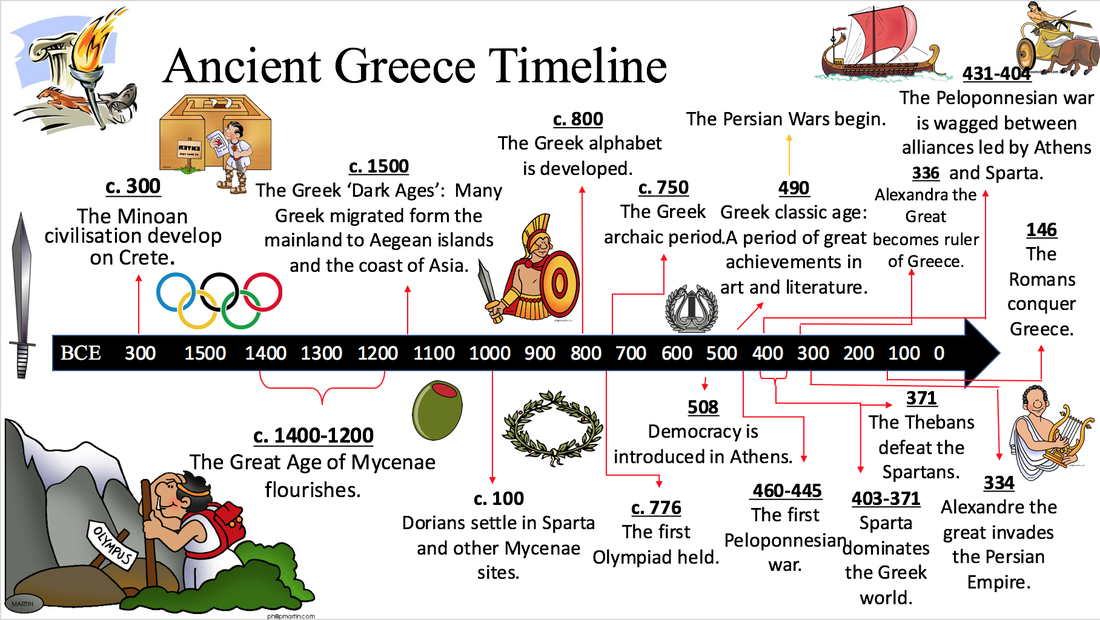
1.1 Greek civilisation
Ancient Greece was not one big country: it was divided into many independent cities. As each city had its own government, we call the city states*. So why do we talk about Greek civilisation?
who all spoke the same language
•who worshipped the same gods
•who had the same culture
The civilisation of Ancient Greece was in the eastern Mediterranean. The landscape in Greece, which is very different from the landscape in Mesopotamia and Egypt, affected how the civilisation developed:
Greece is moutainous, which protected the cities against being attacked
•Most cities were by the sea, and many cities were on islands. Fishing and trade by sea were very important, so the Greeks were good sailors
•The soil in Greece is poor, so when the population grew, there was not enough food. Some Greek people emigrated*.
•The people who emigrated built new towns. These towns, which were called colonies, traded with Greece, and with the local people. The colonies helped to spread* Greek ideas and culture
•The Greeks established colonies* in Italy, France, Spain, Turkey and North Africa


1.2 The origins of Greece: Crete and Mycenae
The first Greek civilizations were: The Minoan (from the island of Crete), whose characteristics were:
Maritime trade
•The construction of palaces
•Development of the first writings in the area (linear A and B)
•In this civilization the famous myth of Theseus and the Minotaur was given
And the Mycenaean civilization (of Mycenae), which occurred in the Peloponnese peninsula towards the years 2000 and 1600 B.C.
They were great warriors, they conquered the island of Crete
•In this civilization there was the famous myth of the Trojan War

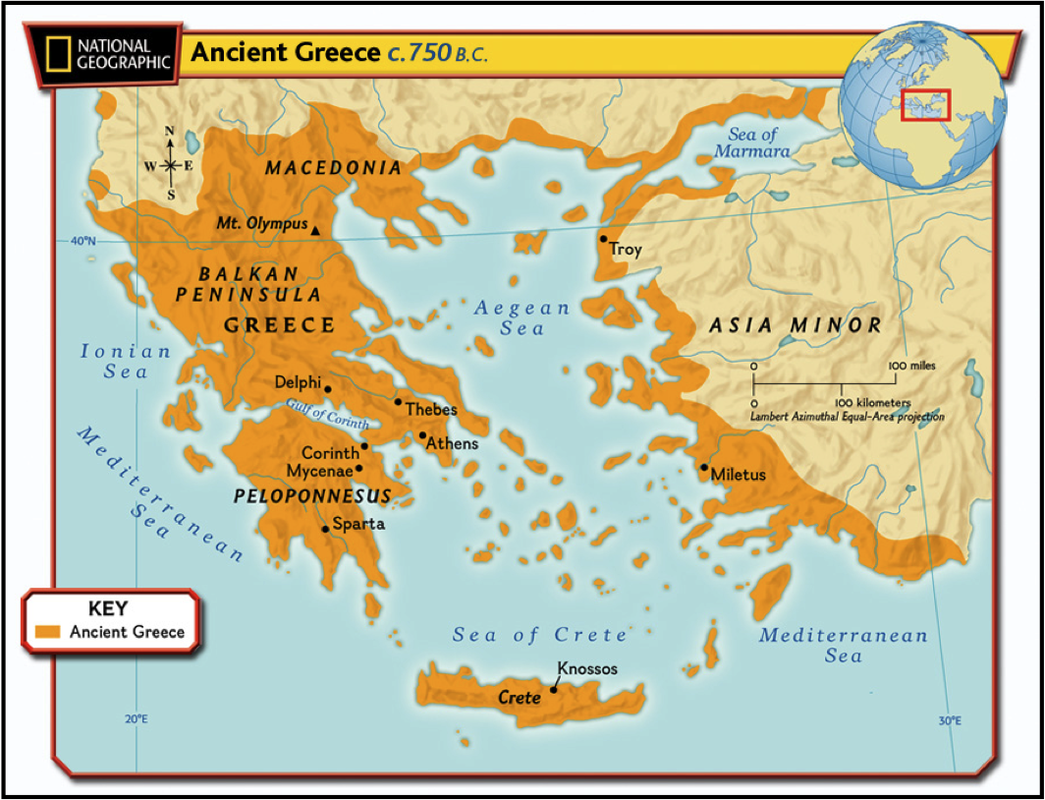


PERSIAN WARS
The Persian Empire was a big and powerful empire, which extended from Turkey to India. The Persians, who had a much bigger army, wanted to control Greece
•In 492 BC the Persian emperor, Darius I, sent a big army to conquer Greece. Only Athens and Sparta refused to surrender
•In 490 BC the Persian fleet arrived at Marathon, which is close to Athens. The Athenians sent Pheidippides, who was their fastest runner, to Sparta to ask for help
Sparta refused* to send an army to help Athens, but the Athenians won the battle anyway •Pheidippides ran 42 km from Marathon to Athens to tell the good news. After reaching the city, he gave the news and died
•In 480 BC the emperor Xerxes attacked Greece with an even bigger army. He won several battles, but he was finally defeated* by the Athenians and Spartans. ThePersians never managed to control all of Greece
3. ATHENS AND SPARTA
The two most important city states in Ancient Greece were Athens and Sparta. Sometimes Athens and Sparta were allies*, but often they were at war.
•Athens was a kind of democracy*, but only male citizens could participate
•Sparta was an oligarchy*, which was run by two rulers and a senate* of 30 men over the age of 60
•Everyday life in the two cities was also very different
BABIES
ATHENS: Baby boys in Athens are looked after by their parents, but baby girls are sometimes abandoned in a public place. Nomally these girls are adopted as slaves
SPARTA: When a baby is born in Sparta, the senate checks whether it is strong and healthy. They kill weak babies (even if they are boys) by throwing them off a cliff

BOYS
ATHENS: Boys in Athens go to school, where they learn to read and write, and study maths. They also learn to play the lyre. Boys are given more food than their sisters, because people think boys are more important
SPARTA: Boys in Sparta have to leave their parents and live at school. They spend most of the time doing physical training. This is to make them strong for the army. They also learn to read, write and play music
GIRLS
ATHENS: Girls learn how to look after the house. They do not go to school. After they marry, girls move to their husband’s house. They stay at home almost all of the time
SPARTA: Girls also do lots of physical exercise to make them strong and healthy mothers. They go to school and do not have to stay at home all the time
WORK
ATHENS: Most men are farmers*, but they have slaves who help them with the hardest jobs. Athenian men sometimes have to fight against the enemies of Athens
SPARTA: Spartan men are soldiers, so they don’t work. They capture slaves in battles, and make them do the work. The slaves are called Helots*, and the Spartans treat them badly
LEISURE
ATHENS: Men in Athens go to drinking parties called symposia*, where they listen to music, talk about philosophy and discuss politics
SPARTA: People in Sparta believe in living a simple life. They eat simple food, do not drink much wine and have simple clothes
4. Greek society
CITIZENS AND NON-CITIZENS: People who lived in Greek cities were either citizens or non-citizens, which was a very important difference.
•Only men who came from the city were citizens
•Foreigners*, women and slaves were all non-citizens
•Foreigners aren’t treated badly. They pay taxes and fight in wars, just like citizens. And they can own* property. But they are not involved in governing the city
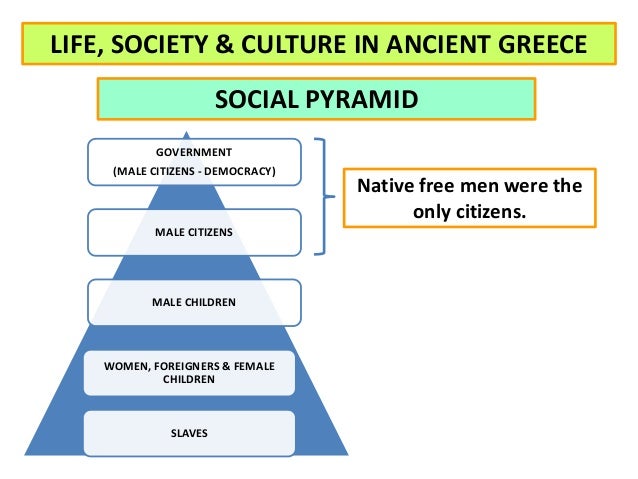
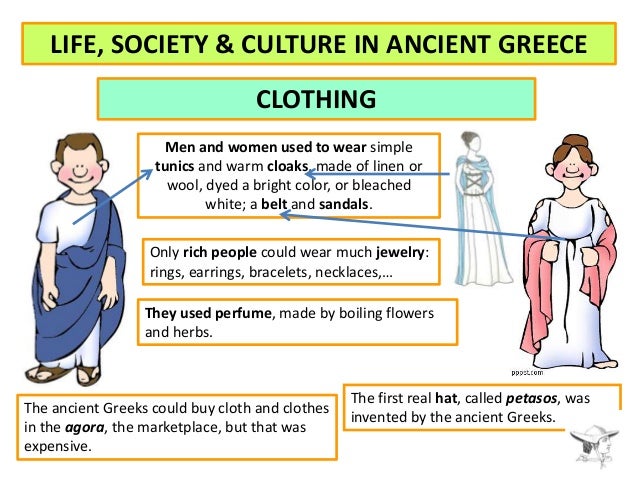
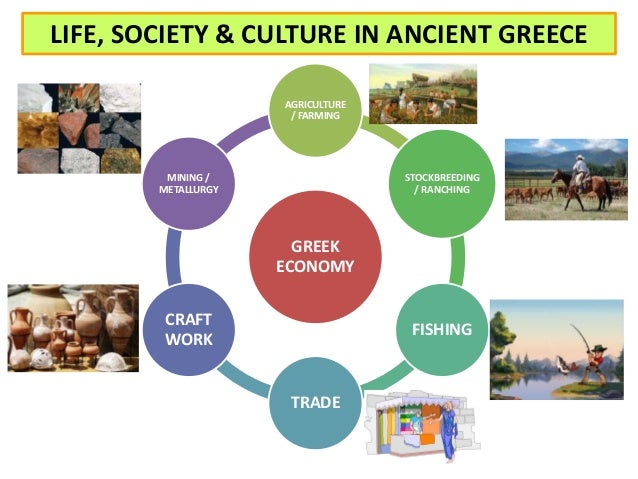


•CLOTHES: Greek men and women wore tunic called chiton*. Women also wore a different type of tunic called a peplos*. If it was cold, men and women wore a heavy cloak* called
5. The Olympic games
The Greeks believed that physical exercise was important, and young men and women often raced against each other competitions. The most important competition, which was held at Olympia, was the Olympic games:
•The first Olympic Games were held in 776 BC.
•The competitors, who were all men, came from all of the Greek city-states. If the cities were at war, they stopped fighting during the Olympic Games
•Winners were given an olive branch, or other prizes like bronze tripods or pottery
•The athletes were naked*, so married women were not allowed to watch
•The last Olympic Games were held in 393 AD, when Greece was part of the Roman Empire
6. Religion, myths and legends
Religion was a very important part of life in Ancient Greece. Each city had its own god and its own religious festival. During festivals, there were processions and competitions. Rituals were also part of everyday life: for example they sacrificed animals at altars outside the temples. The Greeks believed that gods are like people: they fall in love, argue, get gealous and want revenge. The gods livved on Mount Olympus, except Hades, who lived in the Underworld
MYTHS AND LEGENDS
Storytelling was a very important part of life in Ancient Greece. Very few people knew how to read or write, so people told stories from memory. They passed the stories on from generation to generation. Luckily for us, the poet Homer finally wrote down some of the most famous stories. One of these was the story of the war between the Greeks and Trojans
A GREEK MYTH: THE JUDGEMENT OF PARIS:The most beautiful goddes on Mount Olympus will win a golden apple. Hera, Athena and Aphrodite ask Zeus which of them is most beautiful. Zeus, who doesn’t want to make any of them angry, asks a Trojan prince, called Paris to decide. Each goddes promises to give Paris a present if he chooses her. •Helen is Married to Menelaus, who is king of Sparta. Aphrodite helps Paris to steal Helen from her husband. Hera and Athena who are very angry with Paris, become his enemies
A GREEK LEGEND: THE TROJAN HORSE: When Paris steals Helen and takes her to Troy, the Greeks are furious. They send a big army to Troy. For ten years the surround the city, but it has huge walls, so they can’t get in.
•Then Odysseus has an idea: the Greeks pretend to sail away from Troy, but they leave a big wooden horse behind
•The people of Troy take the horse into the city, and when it is dark the Greek soldiers come out. They open the doors to the city to let the rest of the Greek army in.
•The Trojans, who think the Greeks have gone home, are having a big party to celebrate. This makes it easy for the Greeks to win the battle.
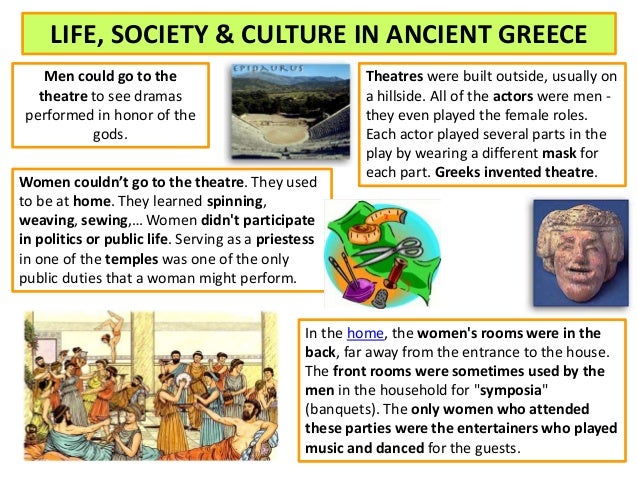
7. ARTS AND SCIENCES
The Ancient Greeks, who thought education was very important, were specially interested in history, science, maths, medicine, literature, philosophy and theology*
Hippocrates: was one of the first doctors to use scientific ideas to cure people. He thought that all doctors should promise to be a good doctor. Modern doctors still make this promise, which is called the Hippocratic Oath: “Prevention is better than a cure”
•Archimedes, Euclid and Pythagoras: were three really important Greek mathematicians. People still study their theories today. Archimedes discovered an important scientific theory when he was having a bath. He was so excited that he ran down the road naked shouting “Eureka!”.

Socrates, Plato and Aristotle: were three of the most important philosophers in Ancient Greece. Aristotle studied at Plato’s Academy in Athens. Later he taught logic, physiscs, biology, literature, language and politics. His most famous pupil was Alexander the Great
8. THEATRE•The actors performed tragedies and comedies on a stage •The audience sat in a big, sloping auditoriumThe theatre was very important in Ancient Greece. Thatres were quite similar to modern theatres:However, there were also some important differences:
•The actors were all men: they played both the male and female parts •The plays told the stories of myths and legends, and the characters were both gods and humans
9. GREEK ARCHITECTUREThe Ancient Greeks built their cities using stone. Stone is very strong, which is why many buildings from Ancient Greece are still there. People think that Ancient Greek buildings are very beautiful, so buildings in modern cities often have a similar style.
GREEK CITIES Greek cities were carefully planned. They had an lower part, and a upper part
-LOWER CITY the lower part was arranged around a big open square called an agora, which was where people met to discuss politics. The agora was also a market place, where people bought and sold things

-ACROPOLIS
The upper part, which was called the acropolis, was where they built the most important temples. It was also where the people went if the city was attacked
The Acropolis in Athens: When people talk about the acropolis, they normally mean the acropolis in Athens.
•On the Athens acropolis there was a famous temple, which was called the Parthenon. It was built around 440 BC, in honour of the Goddes Athena, who was the protector of Athens.
•There was also a 9-metre bronze statue of the Goddes Athena



10. SCULPTURE
The Ancient Greeks, who were great sculptors, often made scultures that showed scenes from myths and legends. Each period of Ancient Greek history had its own style of sculpture.



11. A L E X A N D E R T H E G R E A T
Alexander, who was born in 356 BC, was the son of King Phillip II of Macedonia. Macedonia was not part of Greece, but Alexander, who was educated by the Greek philosopher Aristotle, learned all about Greek culture. When Philip was assassinated in 336 BC, Alexander became king of Macedonia. He was only 20 years old. Alexander is known as the Great, because he:
conquered the whole of the huge and powerful Persian Empire
•never lost a battle (and he fought a lot of battles)
•built 70 new cities, including Alexandria in Egypt
•spread Greek culture in Persia and Egypt
Alexander died of illness in Babylon in 323 BC. He was only king for 13 years, but he is one of the main reasons why Greek culture had such a big influence on the world:
He told everyone he met about Greek ideas
•His soldiers also stayed in cities that he conquered and married local women

VOCABULARY
Acropolis – An acropolis is a fortified citadel within a larger city. It is usually located on top of a hill and at the center of the city. The most famous acropolis is the Acropolis of Athens.
Agora – The agora was the central meeting place in Ancient Greek cities. Democracy was born at the agora in Athens.
Alexander the Great – A ruler of Ancient Greece who conquered much of the civilized world from Greece to India including Egypt.
Archaic Period – The historical period of Ancient Greece from 800 BC to 480 BC. During this time the city-states of Athens and Sparta began to form. Greek philosophy and theatre began to develop as well.
Aristotle – A Greek philosopher who introduced the idea of observing and recording nature. He also tutored Alexander the Great and began his own school in Athens.
Assembly – In Athens the Assembly consisted of the group of citizens who showed up to vote.
Athens – One of the most powerful Greek city-states, Athens was the birthplace of democracy.
Chiton – A type of clothing worn by the Greeks. It was often made from a single piece of cloth with a belt at the waist.
City-state – A city-state consisted of a large city and the surrounding areas. Ancient Greece consisted of a number of independent city-states such as Athens, Thebes, and Sparta.
Classical Period – The historical period of Ancient Greece from 480 BC to 323 BC. During this time Athens was ruled by democracy. Also, Sparta and Athens fought the Peloponnesian War. It ended with the rise of Alexander the Great.
Cuirass – A piece of armor, usually made from metal, that covered the front of the torso.
Delian League – A group of Greek city-states that joined together to fight against the Persian Empire.
Democracy – A form of government where citizens have a say in how they are ruled including choosing their leaders and deciding on laws.
Ephors – The ephors were five leaders in Sparta who were chosen to oversee the Spartan kings. They were elected annually.
Helots – The helots were the serfs or slaves that worked for the Spartans. The majority of the people who Sparta ruled were helots.
Hellenistic Period – The Hellenistic Period of Ancient Greece lasted from 323 BC when Alexander the Great came to power to 146 BC when Rome conquered Greece.
Homer – A Greek epic poet who wrote the Iliad and the Odyssey.
Hoplite – The hoplites were the citizen-soldiers of the Greek city-states.
Macedonia – A region of northern Ancient Greece, Macedonia was home to the Greek kings Philip II and Alexander the Great.
Oligarchy – A type of government where the power is held by a few people.
Olympics – An athletic event held by the Ancient Greeks every four years.
Peloponnese – A large peninsula located in southern Greece. Many powerful Greek city-states were located here including Sparta, Argos, and Corinth.
Pericles – A leader of Athens during its golden age, Pericles promoted the arts and literature in the city. He also had many of the major structures built including the Parthenon.
Plato – A Greek philosopher who founded the Academy in Athens and wrote many philosophical dialogues.
Polis – The Greek name for a city-state.
Socrates – A Greek philosopher who is considered to be the founder of western philosophy.
Sparta – A power Greek city-state and rival to Athens, Sparta’s culture was based around warfare and preparing for battle.
Stadion – The original Olympic event, the stadion was a running race the length of the stadium.
Strategos – The name for the general of the Athenian army.
Titans – The Titans were the first Greek gods. They were overthrown by their children, the Olympians.
Trireme – A type of boat used by the Ancient Greeks. It had three rows of oars on each side.
Tyrant – The ruler of a Greek city-state, a tyrant was like a king. Today the word tyrant is used to describe a ruler who rules unfairly or unjustly.
